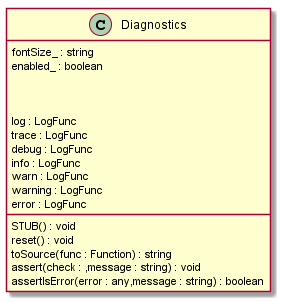Hierarchy
- Diagnostics
Hierarchy-Diagram
Index
Constructors
constructor
-
Parameters
-
Default value enabled: boolean = false
-
Default value fontSize: string = "12px"
Returns Diagnostics
-
Properties
debug
Private enabled_
error
Private fontSize_
info
log
trace
warn
warning
Accessors
enabled
-
Returns boolean
-
Parameters
-
enabled: boolean
Returns void
-
fontSize
-
Returns string
-
Parameters
-
fontSize: string
Returns void
-
Methods
assert
-
evaluates given check expression as a strong invariant never ever violated.
Use assert to ensure an assumption at runtime. When running with assertions enabled, the check expression is evaluated immediately. A check expression evaluating to false signals a violation of invariant that should never happen. If it does, a hard error is output unconditionally to the console and an AssertionError is thrown.
Do not use assertions as a means of ordinary error checking. Here are some valid examples of assertions:
assert(() => Date.now() > 0, 'current time millis can not be before 1970 start of time!'); assert(() => total_price >= item_price, 'total is sum of individual prices and thus can not be less than each one!'); assert(() => num*num >= 0, 'squared num is less than zero!');Parameters
-
check: AssertionCheck | boolean
expression validating an assumption of the calling code, typically an arrow-function expression.
-
Optional message: string
optional explanation of disaster.
Returns void
-
assertIsError
-
used in catch-blocks or Promise rejection callbacks to ensure the caught value is an Error.
Parameters
-
error: any
to check.
-
Optional message: string
of disaster.
Returns boolean
value evaluating to true stating error is an instance of Error.
-
Private reset
-
Returns void
Static Private STUB
-
Returns void
Static Private toSource
-
uses toSource() if available, falling back to toString() otherwise.
Parameters
-
func: Function
to generate source of.
Returns string
of func.
-

console featuring coloring, fontSize and enabled state.